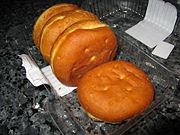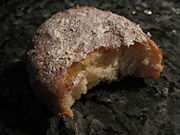
Fasnachts
Encyclopedia


Doughnut
A doughnut or donut is a fried dough food and is popular in many countries and prepared in various forms as a sweet snack that can be homemade or purchased in bakeries, supermarkets, food stalls, and franchised specialty outlets...
treat served traditionally on Fastnacht Day (Shrove Tuesday
Shrove Tuesday
Shrove Tuesday is a term used in English-speaking countries, especially in Ireland, United Kingdom, Canada, Australia, New Zealand, Philippines, Germany, and parts of the United States for the day preceding Ash Wednesday, the first day of the season of fasting and prayer called Lent.The...
), the day before Lent starts. Fasnachts were made as a way to empty the pantry of lard, sugar, fat, and butter, which were traditionally fasted from during Lent
Lent
In the Christian tradition, Lent is the period of the liturgical year from Ash Wednesday to Easter. The traditional purpose of Lent is the preparation of the believer – through prayer, repentance, almsgiving and self-denial – for the annual commemoration during Holy Week of the Death and...
.
Basel
Basel
Basel or Basle In the national languages of Switzerland the city is also known as Bâle , Basilea and Basilea is Switzerland's third most populous city with about 166,000 inhabitants. Located where the Swiss, French and German borders meet, Basel also has suburbs in France and Germany...
, Switzerland
Switzerland
Switzerland name of one of the Swiss cantons. ; ; ; or ), in its full name the Swiss Confederation , is a federal republic consisting of 26 cantons, with Bern as the seat of the federal authorities. The country is situated in Western Europe,Or Central Europe depending on the definition....
conducts an annual fasnacht festival. The Pennsylvania Dutch
Pennsylvania Dutch
Pennsylvania Dutch refers to immigrants and their descendants from southwestern Germany and Switzerland who settled in Pennsylvania in the 17th and 18th centuries...
territory surrounding Lancaster, Pennsylvania
Lancaster, Pennsylvania
Lancaster is a city in the south-central part of the Commonwealth of Pennsylvania. It is the county seat of Lancaster County and one of the older inland cities in the United States, . With a population of 59,322, it ranks eighth in population among Pennsylvania's cities...
, celebrates the custom as well. Most chain supermarkets in the eastern Pennsylvania offer fasnachts, although WalMart offers Pączki
Paczki
Pączki are pastries traditional to Polish cuisine . Pączki is the plural form of the Polish word pączek , though many English speakers use paczki as singular and paczkis as plural. In English, the common pronunciation imitates the Polish pronunciation, but some speakers pronounce the word or...
instead. The pączki is traditionally eaten in Poland on the Thursday prior to Fasnacht Day, although in Polish communities of the US, the tradition is more commonly celebrated on Fasnacht Day. Commonly pączki are round, rather than having straight sides, and they are filled with jelly, or sometimes creme filling.
In parts of Maryland, the treats are called Kinklings, and are only sold in bakeries on Shrove Tuesday
Shrove Tuesday
Shrove Tuesday is a term used in English-speaking countries, especially in Ireland, United Kingdom, Canada, Australia, New Zealand, Philippines, Germany, and parts of the United States for the day preceding Ash Wednesday, the first day of the season of fasting and prayer called Lent.The...
. The German version is made from a yeast dough, deep fried, and coated or dusted in sugar or cinnamon sugar; they may be plain or filled with fruit jam. Pennsylvania Dutch fasnachts can often be potato doughnut
Potato doughnut
The potato doughnut, sometimes called a Spudnut, is a doughnut, typically sweet, made with either mashed potatoes or potato starch instead of flour, the most common ingredient used for doughnut dough. Potato doughnuts were introduced in the mid-1900s, and a recipe was published in 1938...
s, and may be uncoated, powdered with table sugar, or dusted with confectioner's sugar.
The term is synonymous with the Carnival season Fasnacht in southern Germany, Switzerland, Alsace and Austria. Although usually written "Fastnacht", there are many local spoken varieties: Fasnacht, Fassenacht, Fasnet etc.

